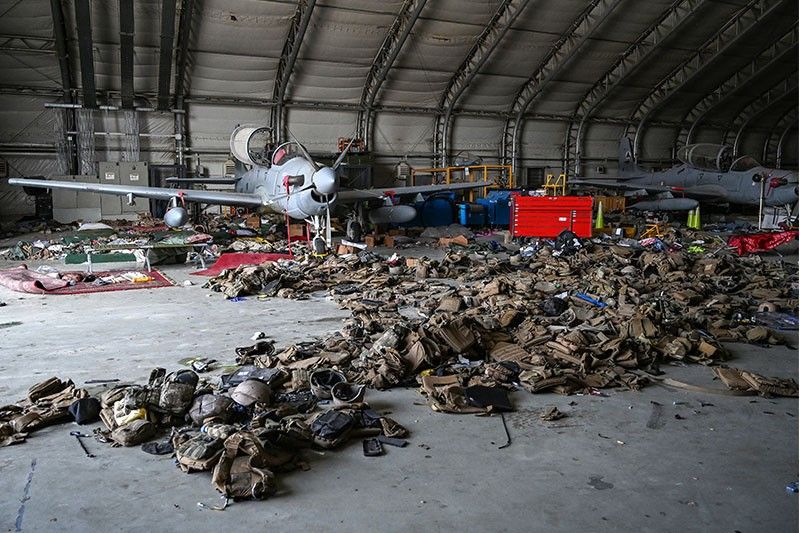Taliban show off US plunder as first flight lands in Kabul since pullout

KABUL, Afghanistan — The Taliban on Wednesday paraded some of the military hardware they captured during their takeover of Afghanistan, as a team from Qatar landed at the trashed airport in Kabul — a first step towards getting the facility back up and running as a lifeline for aid.
The Qatar Airways flight, the first to land in Kabul since the US withdrew from Afghanistan Monday, brought a team of technical experts to work on the airport, a source close to the matter told AFP.
The goal was to resume flights for aid, after the United Nations warned of a looming "humanitarian catastrophe" in war-ravaged Afghanistan, and to provide a way out for those wanting to flee the new regime.
Talks are ongoing on who will now run the airport, just one of the many daunting challenges facing the Taliban as they transition from insurgent group to governing power.
The Islamist hardliners — who have not yet announced their new government — are celebrating the US withdrawal as a historic victory after taking control of Afghanistan a fortnight ago.
Their arrival in Kabul capped an astonishing two-week offensive across the country, ending their 20-year insurgency.
On Wednesday, a long line of green Humvees and armoured fighting vehicles drove in single file along a highway outside Kandahar — the spiritual birthplace of the militant movement — many flying white-and-black Taliban flags.
A helicopter flew overhead trailing the Taliban's standard as fighters wrapped in headscarves waved beneath.
At least one Black Hawk helicopter has been seen flying over Kandahar in recent days, suggesting someone from the former Afghan army was at the controls as the Taliban lack pilots.
Word had spread that the Taliban's secretive supreme leader Hibatullah Akhundzada would appear — but he did not show, leaving the city's new governor to address the crowd.
'Our business'
The scenes of Taliban triumph came hours after US President Joe Biden gave a defiant speech defending the decision to end America's longest war, and the frenzied evacuation effort that ensued as the Afghan government collapsed.
The president, who has been savaged by critics over the withdrawal, which saw the US and its allies evacuate more than 122,000 people in just over two weeks, hailed the operation as an "extraordinary success".
Many thousands of Afghans who fear Taliban retribution were left behind, however.
"Everybody who lived it is haunted by the choices we had to make and by the people we were not able to help depart," a senior US State Department official said Wednesday, speaking on condition of anonymity.
Women sidelined
Many Afghans are terrified of a repeat of the Taliban's initial 1996-2001 rule, which was infamous for their treatment of women, as well as a brutal justice system.
The group has repeatedly promised a more tolerant brand of governance this time around.
On Wednesday, they even approved Afghanistan's first cricket Test match since their takeover, raising hopes that international matches — long a bright spot for the country — will continue under the Islamists' rule.
Still, senior Taliban leader Sher Mohammad Abbas Stanikzai told BBC Pashto that while women could continue working, there "may not" be a place for them in the cabinet of any future government or any other top post.
The US-led airlift began after the Taliban completed an astonishing rout of government forces and took over Kabul on August 15.
It finished just before the August 31 deadline set by Biden to end the war, which began with a US-led invasion that ousted the Taliban in the wake of the 9/11 attacks.
The conflict killed tens of thousands of Afghans and more than 2,400 American service members.
Top US general Mark Milley suggested Wednesday that the US could now work with the Taliban against the Islamic State group.
But he was cautious, telling reporters in Washington: "We don't know what the future of the Taliban is, but I can tell you from personal experience that this is a ruthless group... And whether or not they change remains to be seen."
Get the latest news as Taliban gains control of Afghanistan. Photo courtesy of Al Jazeera/AFP
Afghanistan's supreme leader said Sunday the country's women were being saved from "traditional oppressions" by the adoption of Islamic governance and their status as "free and dignified human beings" restored.
In a statement marking this week's Eid al-Adha holiday, Hibatullah Akhundzada -- who rarely appears in public and rules by decree from the Taliban's birthplace in Kandahar -- said steps had been taken to provide women with a "comfortable and prosperous life according to Islamic Sharia".
The United Nations expressed "deep concern" last week that women were being deprived of their rights under Afghanistan's Taliban government and warned of systematic gender apartheid.
Since returning to power in August 2021, Taliban authorities have stopped girls and women from attending high school or university, banned them from parks, gyms and public baths, and ordered them to cover up when leaving home.
They have also barred them from working for the UN or NGOs, while most female government employees have been dismissed from their jobs or are being paid to stay at home.
However, Akhundzada said "necessary steps have been taken for the betterment of women as half of the society".
"All institutions have been obliged to help women in securing marriage, inheritance and other rights," his statement read. — AFP
UN chief Antonio Guterres will gather international envoys at a secret location in Doha on Monday in an increasingly desperate bid to find ways to influence Afghanistan's Taliban rulers. — AFP
The UN Security Council adopted a resolution Thursday calling on Taliban authorities to "swiftly reverse" all restrictive measures against women, condemning in particular its ban on Afghan women working for the United Nations.
The resolution, unanimously adopted by all 15 Council members, said the ban announced in early April "undermines human rights and humanitarian principles."
More broadly, the Council called on the Taliban government to "swiftly reverse the policies and practices that restrict the enjoyment by women and girls of their human rights and fundamental freedoms."
It cited access to education, employment, freedom of movement, and "women's full, equal and meaningful participation in public life."
The Council also urged "all States and organizations to use their influence" to "promote an urgent reversal of these policies and practices." — AFP
G7 foreign ministers on Tuesday demanded the "immediate reversal" of a ban on women in Afghanistan working for non-governmental organisations and the United Nations.
"We call for the immediate reversal of unacceptable decisions restricting human rights and fundamental freedoms, including the latest bans prohibiting Afghan women from working for NGOs and the UN," the top diplomats said in a statement after two days of talks in Japan.
The group also slammed the Taliban authorities' "systematic abuses of human rights of women and girls and discrimination against the members of religious and ethnic minorities".
Taliban authorities triggered international outrage this month after extending a December ban on Afghan women working for non-governmental organisations to include the UN.
They have rejected criticism over the move, saying it is an internal issue that should be "respected by all sides." — AFP
The United Nations is being forced to make an "appalling choice" over whether to continue operations in Afghanistan while the Taliban government bans women from working for the organisation, the world body says.
Under their austere interpretation of Islam, Taliban authorities have imposed a slew of restrictions on Afghan women since seizing power in 2021, including banning them from higher education and many government jobs.
In December, they banned Afghan women from working for domestic and foreign non-governmental organisations, and on April 4 extended that to UN offices across the country.
In a statement Tuesday, the UN mission in Afghanistan said the ban was "unlawful under international law, including the UN Charter, and for that reason the United Nations cannot comply".
"Through this ban, the Taliban de facto authorities seek to force the United Nations into having to make an appalling choice between staying and delivering in support of the Afghan people and standing by the norms and principles we are duty-bound to uphold," it said. — AFP
- Latest
- Trending


































